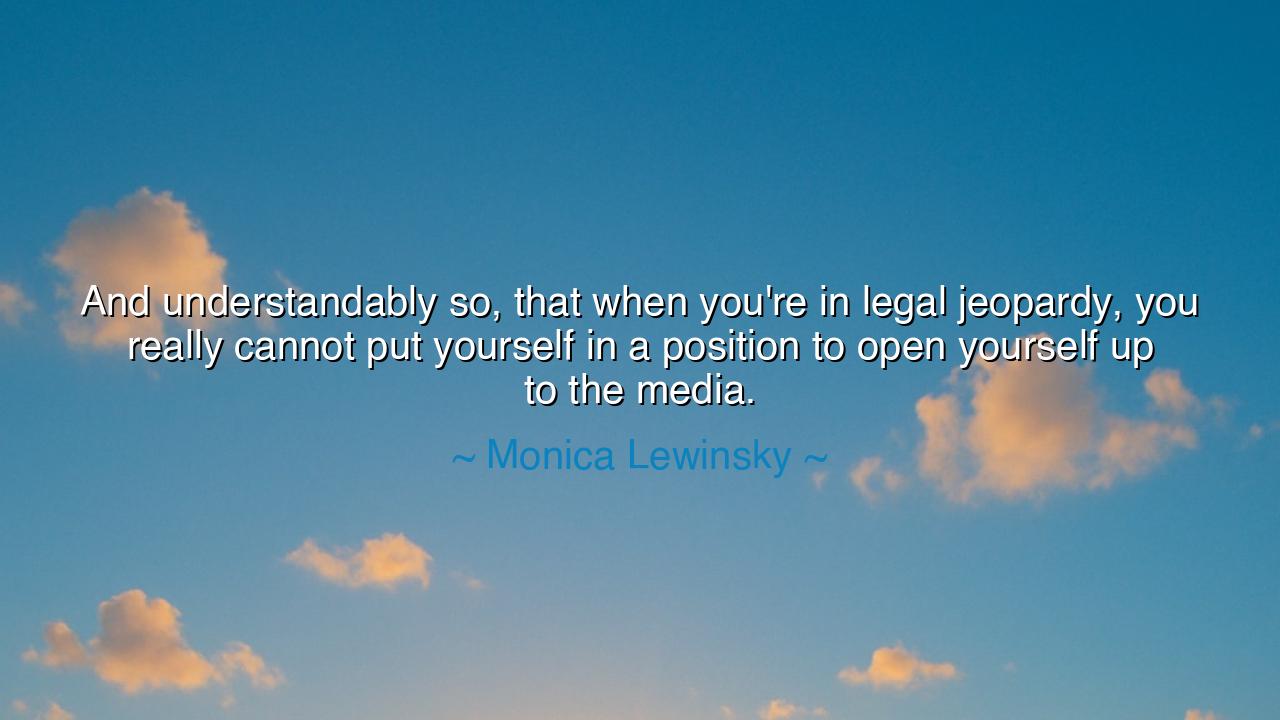
And understandably so, that when you're in legal jeopardy, you
And understandably so, that when you're in legal jeopardy, you really cannot put yourself in a position to open yourself up to the media.






When Monica Lewinsky said, “And understandably so, that when you're in legal jeopardy, you really cannot put yourself in a position to open yourself up to the media,” she spoke with the hard-won wisdom of one who had walked through public fire and survived. Her words are not merely about law or press — they are about the fragility of the human soul under judgment, about the peril of exposure in an age of spectacle. Beneath their calm tone lies a profound truth: that when the storm of accusation rises, silence becomes not cowardice, but self-preservation.
The origin of this quote rests in one of the most turbulent chapters of modern American history — the scandal that bore Lewinsky’s name, entwining a young woman’s private life with the machinery of politics and the unrelenting gaze of the media. In the late 1990s, she found herself at the center of a global storm — investigated, scrutinized, and dissected by both the legal system and a ravenous press corps. To be “in legal jeopardy” meant more than facing judgment in court; it meant existing within a world that demanded confession, apology, and explanation, yet punished every word spoken. Her statement, then, was not only practical advice but a reflection of deep emotional truth — that in times of peril, the voice of one’s own defense must often fall silent before the noise of the world.
History has always shown that public trials are not confined to the courtroom. In the days of ancient Rome, a man accused before the Senate or the mob might plead his case before the people — but the crowd’s judgment was often swifter and harsher than the law’s. Consider the tale of Socrates, condemned not for crime, but for perception. The philosopher’s words, misunderstood and misrepresented, became his undoing. Had he chosen silence, he might have lived; instead, he chose truth, and drank the hemlock with serenity. Lewinsky’s words, born from a different age, echo the same dilemma — when one’s voice is weighed not in reason but in rumor, speech becomes a double-edged sword.
Her insight reveals the tension between truth and self-defense, between the heart’s desire to explain and the mind’s awareness of consequence. The media, that vast modern chorus, demands openness yet devours vulnerability. To “open yourself up” is to expose your wounds to those who profit from their display. Lewinsky’s restraint was not weakness, but wisdom — the understanding that in moments of public danger, dignity lies in silence. The ancients would have called this temperance: the discipline to speak only when speech serves virtue, and to withhold one’s words when they would be twisted by the winds of judgment.
And yet, beneath her caution lies an even deeper tragedy — the cost of a world that prizes scandal over understanding. In her experience, we glimpse the truth that the court of public opinion is often crueler than any tribunal of law. The law, at least, demands evidence; the crowd demands entertainment. Many through history have perished under this invisible tribunal — their reputations shattered not by guilt, but by narrative. Mary Stuart, Queen of Scots, knew this all too well: imprisoned, maligned, and executed, not merely for conspiracy, but for how her story was told. Her name, like Lewinsky’s, became legend before it became understood.
But from such suffering arises a noble wisdom. Lewinsky’s words are not those of bitterness, but of maturity — a recognition that self-control is the highest form of power when chaos reigns. In the face of shame, silence can become the armor that protects the spirit from annihilation. She reminds us that not every truth must be spoken at once, and not every battle must be fought in public. There are times when dignity demands withdrawal, when the wise must protect their peace rather than feed the flames of controversy.
Thus, the lesson she offers is enduring: guard your voice when the world demands your ruin. In times of misunderstanding, speak carefully, or not at all. Know that the loudest truth is often the one preserved in patience, not proclaimed in panic. As the ancients taught, words once released cannot be recalled, and even the innocent may be destroyed by their own openness. When storms of judgment arise, let restraint be your ally, and let integrity be your refuge. For in the stillness of silence, the soul finds what the clamor of the world cannot give — the strength to endure until truth, like the dawn, returns to light the sky once more.






AAdministratorAdministrator
Welcome, honored guests. Please leave a comment, we will respond soon